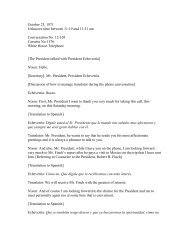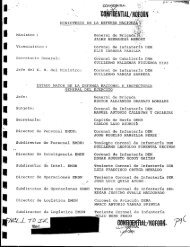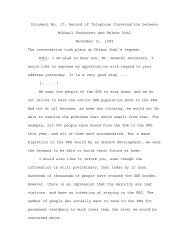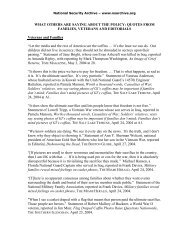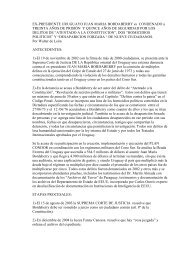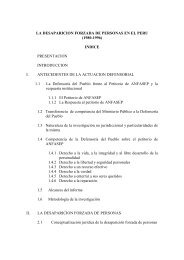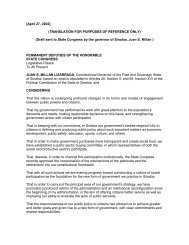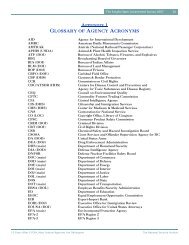TERRORISM 98 - FBI
TERRORISM 98 - FBI
TERRORISM 98 - FBI
Create successful ePaper yourself
Turn your PDF publications into a flip-book with our unique Google optimized e-Paper software.
Acting under the authority of these laws and<br />
Presidential Decision Directive 39, the <strong>FBI</strong> exercises<br />
jurisdiction over extraterritorial terrorist acts when a<br />
U.S. national is a victim or perpetrator of the offense,<br />
the U.S. Government is the victim of the offense, or<br />
the perpetrator is later found in the United States.<br />
Since the mid-1<strong>98</strong>0s, the <strong>FBI</strong> has investigated more<br />
than 350 extraterritorial cases. Prior to conducting<br />
terrorism investigations outside U.S. borders, the <strong>FBI</strong><br />
secures permission from the host country and coordinates<br />
the investigation with the U.S. Department of<br />
State.<br />
More than 900 <strong>FBI</strong> Special Agents were sent<br />
overseas following the August 7, 19<strong>98</strong> bombings of<br />
the U.S. embassies in Nairobi, Kenya, and Dar es<br />
Salaam, Tanzania, which resulted in the deaths of 12<br />
Americans. This represented the largest overseas<br />
deployment in <strong>FBI</strong> history.<br />
The results achieved from the onsite<br />
presence of <strong>FBI</strong> Special Agents were<br />
immediate. Mohammed Rashed Daoud Al-<br />
Owhali and Mohammed Sadiq Odeh were<br />
arrested in Kenya on August 27 and 28,<br />
19<strong>98</strong>, respectively, and surrendered by<br />
Kenyan authorities to the United States to<br />
face charges arising from the embassy bombings.<br />
On September 17, 19<strong>98</strong>, Mamdouh<br />
Mahmud Salim was arrested in Germany<br />
and was later extradited to the United<br />
States to face similar charges arising from<br />
the twin bombings. This investigation further<br />
reinforced the belief that the cornerstone<br />
of successful international terrorism<br />
investigations is the ability to deploy federal<br />
law enforcement agents to the crime scene<br />
within hours of the incident.<br />
As the above examples demonstrate,<br />
extraterritorial jurisdiction also<br />
allows terrorist suspects to be indicted and<br />
tried in the United States for violation of<br />
federal statutes outlawing terrorist acts. In<br />
the 1990s, several high-profile international<br />
terrorists, including Ramzi Ahmed Yousef,<br />
Shaykh Omar Abdel Rahman, Omar<br />
Mohammad Ali Rezaq, and Tsutomu<br />
Shirosaki, were tried and convicted in the<br />
United States for acts of terrorism. The<br />
trend continued in 19<strong>98</strong> when on June 3 Mohammed<br />
Rashid was arrested overseas and brought to the<br />
United States to stand trial for the August 11, 1<strong>98</strong>2<br />
bombing of Pan Am Flight 830. The bombing resulted<br />
in the death of a Japanese youth and injury to several<br />
other passengers.<br />
The evolution of judicial and enforcement<br />
jurisdiction over the last two decades has effectively<br />
empowered the <strong>FBI</strong> to respond to terrorist attacks targeting<br />
U.S. nationals and interests outside the<br />
United States. Terrorism is a global phenomenon,<br />
and as such, the <strong>FBI</strong> is prepared to respond to terrorist<br />
acts on a global scale. Since extraterritorial<br />
authority was extended to the <strong>FBI</strong> in the mid-1<strong>98</strong>0s,<br />
the <strong>FBI</strong> has demonstrated that the ability to conduct<br />
on-site criminal investigations wherever terrorist<br />
strikes occur greatly enhances the likelihood that<br />
those responsible will be brought to justice.<br />
● NAIROBI, KENYA<br />
<strong>TERRORISM</strong> IN THE UNITED STATES 19<strong>98</strong><br />
16




